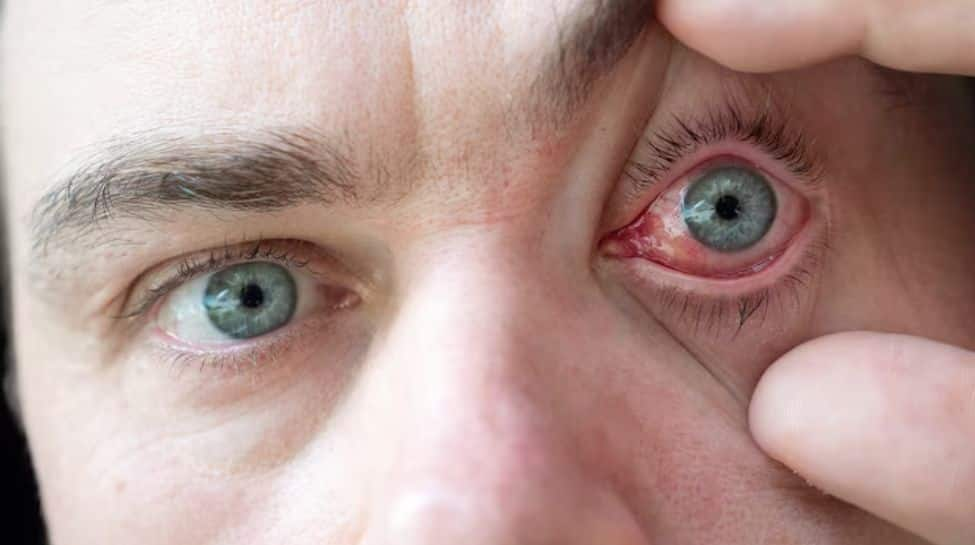As the festive season wraps up, the air turns visibly heavier with smog, smoke, and suspended particles — a mix that can take a serious toll on your eyes. The days after Diwali often bring a sharp dip in air quality, exposing the eyes to irritants that cause dryness, itching, and redness. Prolonged exposure to polluted air does not just cause temporary discomfort; it can lead to infections and inflammation if ignored.
Here’s a look at the most common eye problems as shared by Dr. Kalpa Negiloni, Head of Clinical Research at Remidio linked to rising air pollution, how to recognize them early, and what you can do to protect your vision.
1. Dry Eyes: When Your Eyes Beg for Moisture
After Diwali, the air becomes dense with smoke and fine particles that disrupt the tear film and strip away natural eye moisture. The result? That gritty, burning feeling – as if someone sprinkled dust straight into your eyes. If you find yourself blinking more than usual, experiencing a foreign body sensation, or feeling like your contact lenses are suddenly made of sandpaper, your eyes are probably crying out (literally) for hydration. Keep lubricating eye drops handy, temporarily avoid contact lens use, avoid stepping out when the air looks hazy, and remember your eyes need hydration just like your skin does.
2. Allergic Conjunctivitis: The Itch You Can’t Ignore
If your eyes start itching a lot, it might not just be the leftover glitter from your festive makeup. Airborne irritants from crackers like sulphur and metallic residues can trigger allergic conjunctivitis. The telltale signs include red, watery eyes and the irresistible urge to rub them (which, trust us, only makes things worse). Cold compresses can help soothe the itch, but if the redness or tearing persists, it’s best to see an ophthalmologist for further treatment.
3. Eye Infections: When the Post-Fireworks Fog Brings Trouble
The smoky air doesn’t just cloud the skyline it can also weaken your tear film, the natural shield protecting your eyes from germs. This makes you more prone to infections If you wake up with sticky eyelids or feel like your eyes are glued shut in the morning, you might be dealing with an infection. Resist the temptation to self-medicate or use random “redness relief” drops. Whatever you do, don’t share your towel or makeup and consult an eye specialist without delay.
4. Corneal Inflammation: When Tiny Particles Cause Big Problems
Sometimes, it’s not what you see but what you don’t see that causes damage. Microscopic particles floating in the polluted air can scratch or irritate the cornea, leading to keratitis (inflammation). You’ll know something’s wrong if your eyes suddenly sting, water uncontrollably, or become painfully sensitive to light. A gentle rinse with clean water might offer temporary relief, but this one’s no DIY fix. Book an appointment with your eye doctor before it turns serious.
5. Old Eye Conditions, New Problems
For those already dealing with issues like glaucoma, dry eyes, or post-surgery recovery, pollution acts like a silent saboteur. The extra dryness, smoke, and heat can worsen discomfort and blur vision temporarily. If you already use medicated drops or have a follow-up scheduled, don’t skip it — pollution season is not the time to test fate. And yes, wearing sunglasses (even at night!) is perfectly acceptable when it comes to saving your vision.
When to Blink and Call the Doctor
If your eyes stay red, itchy, or watery for more than two days, don’t ignore it. These might seem like small issues, but prolonged irritation can damage your cornea or lead to infections. Early diagnosis keeps things simple and pain-free.
As the festive lights dim and the season settles, your eyes deserve a little post-Diwali TLC too. Taking a few small precautions today can help you see every sparkle, selfie, and sunset tomorrow with clarity. So, while you detox your body and clean up your home after the celebrations, don’t forget your eyes because true festive glow begins with clear, healthy vision.
(This article is meant for informational purposes only and must not be considered a substitute for advice provided by qualified medical professionals. Always seek the advice of your doctor with any questions about a medical condition.)

